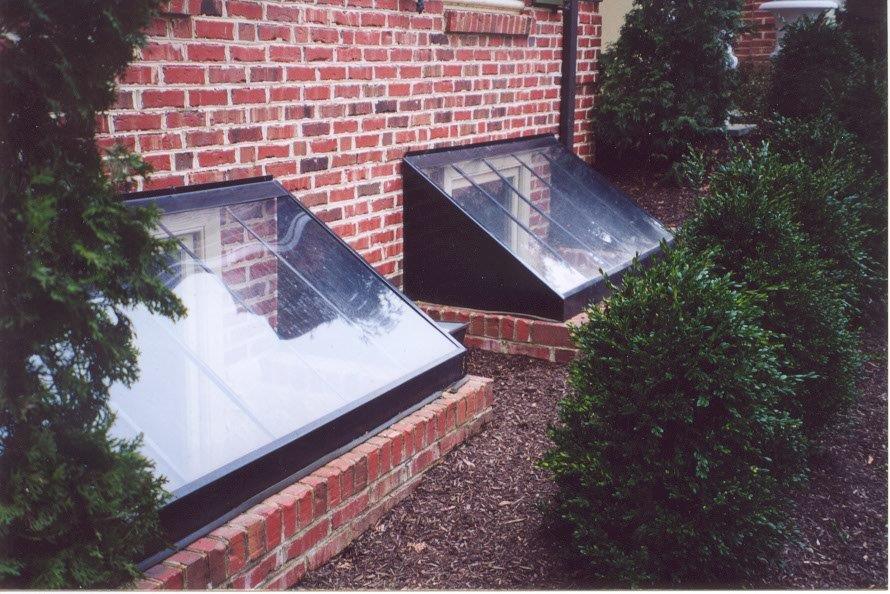
Have you ever dreamt of transforming your dark, dreary basement into a bright, inviting space? Window wells are a great way to dramatically enhance both the functionality and aesthetics of an area of your home that can otherwise feel a bit drab.
There are many different purposes and benefits of installing window wells in your home or commercial building, and there are various shapes, sizes, and materials to choose from. Let’s shed some light (literally!) on this often-overlooked feature that can significantly improve the basement area of your home or business.
In the case of a basement window well, it refers to the excavated area around the window that extends below ground level. It is built outside a basement or egress window to allow for natural light and ventilation. The extra source of ventilation can also be beneficial in basement areas that tend to be musty and, sometimes, moldy. However, basement windows can expose the home to many exterior hazards without proper protection.
The primary purpose of a window well is to prevent soil and debris from blocking the window and help prevent water from accumulating around the window. This reduces the risk of water damage and flooding from rain and melted snow and ice in the basement. Window wells are installed to create a space between the window and the surrounding land, allowing natural light to flood into below-ground spaces while also preventing damage from the elements.
In many regions, building codes require the installation of egress windows in basement or below-grade living spaces for safety reasons. Additionally, these codes often specify the size, design, and construction of a window well to ensure they meet specific safety standards and provide adequate egress in emergencies.
Window wells bring a touch of the outdoors and all its natural light into your basement while maintaining a layer of protection between the window and the outdoors. This influx of sunshine and fresh air instantly brightens the space, making it more open and inviting.
Window wells aren’t just for residential properties; some commercial buildings with underground spaces can also benefit from their safety and light-boosting capabilities. Consider spaces like workshops, storage areas, or even specific retail spaces that could be enhanced with natural light and emergency exits. Whether it’s a quaint basement apartment or a busy office complex, window wells can offer a versatile solution for all types of properties.
Window wells aren’t a one-size-fits-all solution. They come in various shapes and sizes to fit your home or building’s specific needs and architectural style. Ultimately, the right window well for your home or property will depend on your needs, budget, and aesthetic preferences.
Local building codes often have minimum size requirements to ensure proper egress and escape, but common measurements generally range from 3 to 4 feet wide, 5 to 8 feet long, and 3 to 4 feet deep.
Shapes typically include classic rectangles for easy installation alongside foundations or curved, semi-circular options for a softer, more elegant look.
The window well material you choose will depend on the window size and the aesthetics you’re looking to achieve. Some of the most common materials include:
Window wells made from precast concrete offer superior durability and are customizable, enabling them to fit a property’s specific needs. However, they can also be pretty heavy and more expensive than some other options.
Plastic window wells are a lightweight and relatively affordable option. They’re easy to install and come in various shapes and sizes. (Note: plastic window wells are far less durable than other materials, which is why our team does not recommend or install them for our customers)
Steel window wells provide the ideal balance between affordability and durability. They’re relatively lightweight and are available in a variety of shapes, sizes, and styles to fit your needs.
Window well covers are exactly what they sound like: They add a layer of protection from the elements to your basement window and window well. They help keep leaves, debris, and even bugs from potentially finding their way into your basement and causing unnecessary damage. They also provide an additional safety measure for children and pets who might be playing around your basement windows.
Another important thing to consider when installing window wells is having a proper drainage system to divert rainwater away from the foundation of your home or building. Without adequate drainage, water can accumulate, leading to potential problems like cracks and leaks.
Gravel and drainage pipes are commonly used to divert rainwater from your property, protecting your basement from flooding and water damage. Work with a window well expert to ensure your window well drainage system is installed correctly from the start.
Window wells are a powerful tool for transforming your basement. They bring in natural light, creating a significantly more inviting space. When installed and maintained properly, window wells can be a highly beneficial feature for your home or building. They can also enhance the resale value of your home.
To ensure proper installation of your window well, we recommend using an expert window well installation company instead of doing it yourself. By hiring a team of experts with the knowledge of necessary permits, building codes, and safety standards, you can be sure it’s done correctly the first time and avoid unnecessary headaches in the future.
Contact us at Steelway Cellar Doors today to learn more or schedule a no-obligation assessment.